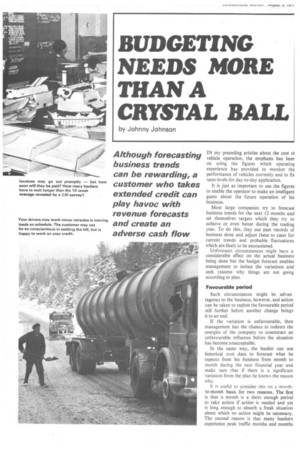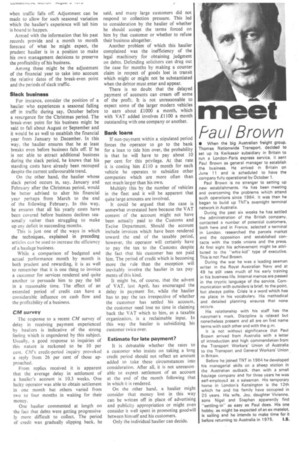BUDGETING NEEDS MORE THAN A CRYSTAL BALL
Page 42

Page 43

If you've noticed an error in this article please click here to report it so we can fix it.
by Johnny Johnson
Although forecasting business trends can be rewarding, a customer who takes extended credit can play havoc with revenue forecasts and create an adverse cash flow
IN my preceding articles about the cost ol vehicle operation, the emphasis has beer on using the figures which operating experience has provided to monitor the performance of vehicles currently and to fix rates levels for day-to-day application.
It is just as important to use the figures to enable the operator to make an intelligent guess about the future operation of his business.
Most large companies try to forecast business trends for the next 12 months and set themselves targets which they try to achieve or even better during the trading• year. To do this, they use past records of business done and adjust these to cater for current trends and probable fluctuations which are likely to be encountered.
Unforeseen circumstances might have a considerable effect on the actual business being done but the budget forecast enables management to isolate the variations and seek reasons why things are not going according to plan.
Favourable period
Such circumstances might be advantageous to the business, however, and action can be taken to exploit the favourable period still further before another change brings it to an end.
If the variation is unfavourable, then management has the chance to redirect the energies of the company to counteract an unfavourable influence before the situation has become unacceptable.
In the same way, the haulier can use historical cost data to forecast what he expects from -his business from month to month during the next financial year and make sure that if there is a significant variation from the plan he knows the reason why.
It is useful to consider this on a monthto-month basis for two reasons. The first is that a month is a short enough period to take action if action is needed and yet is long enough to absorb a freak situation about which no action might be necessary. The second reason is that many hauliers experience peak traffic months and months
when traffic falls off. Adjustment can be made to allow for such seasonal variation which the haulier's experience will tell him is bound to happen.
Armed with the information that his past records provide and a month to month forecast of what he might expect, the prudent haulier is in a position to make his own management decisions to preserve the profitability of his business.
Among these might be the adjustment of the financial year to take into account the relative dates of the break-even point and the periods of slack traffic.
Slack business For instance, consider the position of a haulier who experiences a seasonal falling off in traffic during say, October before a resurgence for the Christmas period. The break-even point for his business might be said to fall about August or September and it would be as well to establish the financial year from January to December. In this way, the haulier ensures that he at least breaks even before business falls off. If he is not able to attract additional business during the slack 'period, he knows that his standing costs have already been recouped despite the current unfavourable trend.
On the other hand, the haulier whose slack period occurs in, say, January and February after the Christmas period, would be better advised to alter his financial year perhaps from March to the end of the following February. In this way, he ensures that all his yearly costs have been covered before business declines seasonally rather than struggling to make up any deficit in succeeding months.
This is just one of the ways in which the techniques, explained in preceding articles can be used to increase the efficiency of a haulage business.
While a comparison of budgeted and actual performance month by month is both prudent and rewarding, it is as well to remember that it is one thing to invoice a customer for services rendered and quite another to persuade him to pay the bill in a reasonable time. The effect of an extended period of credit can have a considerable influence on cash flow and the profitability of a business.
CM survey Thc response to a recent CM survey of delay in receiving payment experienced by hauliers is indicative of the strong feeling which is engendered by this subject. Usually, a good response to inquiries of this nature is reckoned to be 10 per cent. CM's credit-period inquiry provoked a reply from 26 per cent of those approached.
From replies received it is apparent that the average delay in settlement of a haulier's account is 10.3 weeks. One lucky operator was able to obtain settlement in one month but others varied from two to four months in waiting for their money.
One haulier commented at length on the fact that debts were getting progressively more difficult to collect. The period of credit was gradually slipping back, he said, and many large customers did not respond to collection pressure. This led to consideration by the haulier of whether he should accept the terms forced on him by that customer or whether to refuse their business altogether.
Another problem of which this haulier complained was the inefficiency of the legal machinery for obtaining judgment on debts. Defending solicitors can drag out the case for months by making a counter claim in respect of goods lost in transit which might or might not be substantiated when the debtor must enter and appear.
There is no doubt that the delayed payment of accounts can cream off some of the profit. It is not unreasonable to expect some of the larger modern vehicles to earn about £1000 a month, which with VAT added involves .£1100 a month outstanding with one company or another.
Bank loans If non-payment within a stipulated period forces the operator to go to the bank for a loan to tide him over, the probability is that he will have to pay about 10 per cent for this privilege. At that rate it is costing him £110 a month for each vehicle he operates to subsidize other companies which are more often than not much larger than his own.
Multiply this by the number of vehicles in the fleet and it will be apparent that quite large amounts are involved.
It could be argued that the case is somewhat overstated here because the VAT content of the account might not have been actually paid to the Customs and Excise Department. Should the account include invoices which have been rendered toward the end of the taxable period, however, the operator will certainly have to pay the tax to the Customs despite the fact that his customer has not paid him. The period of credit which is becoming more the rule than the exception will inevitably involve the haulier in tax payments of this kind.
It might be, of course, that the advent of VAT, last April, has encouraged the delay in payment for, while the haulier has to pay the tax irrespective of whether the customer has settled his account, the customer need lose no time in claiming back the VAT which to him, as a taxable organization, is a reclaimable input. In this way the haulier is subsidizing his customer twice over.
Estimate for late payment?
It is debatable whether the rates to a customer who insists on taking a long credit period should not reflect an amount added to take these circumstances into consideration. After all, it is not unreasonable to expect settlement of an account at the end of the month following that in which it is rendered.
On the other hand, a haulier might consider that money lost in this way can be written off in place of advertising and publicity appropriation or might even consider it well spent in promoting goodwill between himself and his customers.
Only the individual haulier can decide.
































































































